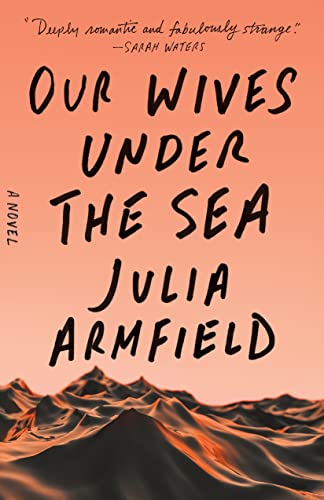Miri and Leah are treading water, drifting around each other in an increasingly silent apartment. Leah is a deep sea researcher who was on a submarine that was meant to be gone for 3 weeks but was unexpectedly gone for 6 months. Leah's wife, Miri, doesn't know how to help Leah process the trauma she experienced when the sub lost power and sank to the bottom of the ocean. Leah doesn't know how to, or can't, tell Miri what happened down there. And so the two women repeat their actions over and over and over again in a hopeless loop. Miri calls the Centre (Leah's employer) to try and get ahold of a person who can help Leah, and perhaps her as well. Leah floats in the bath, water running all the time, her body changing, vomiting water, bleeding from her mouth, and her skin silvering, almost translucent. Both of them are aimless with grief and loss and Leah is increasingly disassociated from this terrestrial life.
The novel is narrated in the first person, alternating between Miri, who tells of their history together and her futile efforts to find "her Leah" instead of this stranger who has returned from 6 months away, and Leah, who tells the reader, but not Miri, the story of what happened to her and to her fellow scientists down in the depths of the ocean. The story is also broken into the oceanic zones: sunlight, twilight, midnight, abyssal, and hadal so the reader knows that things will get darker and more unknowable as the story goes on. This is an essentially plotless, character driven meditation. It is unsettling and surreal in tone. There are many unanswered questions: why is the sub supplied with enough food to last 6 months when the voyage was supposed to be 3 weeks? Why do the upstairs neighbors leave their tv on at all hours and what do the banal shows they watch signify for this marriage that is slowly disintegrating? What is that sound under the water? And how do you grieve someone still present? There is a sort of dreamy horror to this novel which kept me awkwardly distanced from the story. Very little actually happens over the short course of the book and the two women's voices were nigh indistinguishable. The slow moving plot and the endless repetition, like waves rolling out at sea, never getting nearer to shore, turned this into something of a struggle to pick back up after I put it down. In fact, I found I had to reread sentences even right in the middle of the story because I had zoned out completely and not absorbed anything. Everything, characters and plot both, felt vague and strangely insubstantial. I so very much wanted to like this more than I did. Others have raved about it though so perhaps I missed something vital. If you read it, expect no answers to any questions, not in the beginning, the middle, and certainly not in the end.







No comments:
Post a Comment
I have had to disable the anonymous comment option to cut down on the spam and I apologize to those of you for whom this makes commenting a chore. I hope you'll still opt to leave me your thoughts. I love to hear what you think, especially so I know I'm not just whistling into the wind here at my computer.